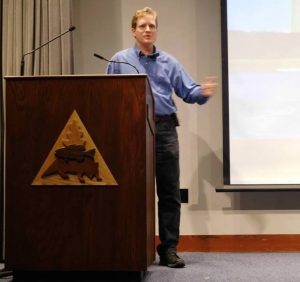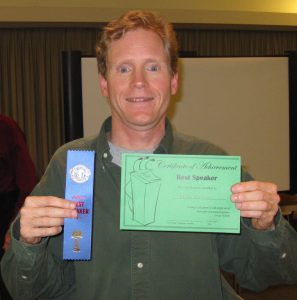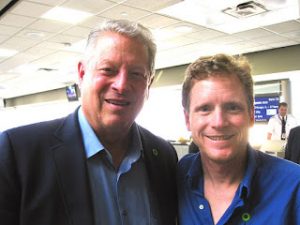
Brian Ettling giving a climate change talk in Jefferson City, Missouri, on March 29, 2017.
For the past seven years, I have given over 150 climate change talks as a National Park Service ranger, Toastmaster, Climate Reality Leader, teaching Climate Change 101 continuing education classes for St. Louis Community College, and a volunteer for Citizens’ Climate Lobby. For three to four years before this, I was scared to give public climate change talks because I was very fearful of encountering climate denial from members of the audience.
March 5 2017, I was a presenter for the Climate Reality Day of Action Training in Denver Colorado on Customizing Your Presentation. My topic was about how to customize and personal your own Climate Reality presentation to relate your talk to your audience. I gave tips such as briefly sharing your own personal story, sharing common values with your audience, include your audience in you talk, use humor if you are comfortable, share local stories of the problem and solution to climate change.
The audience really seemed to love this talk. However, as we shifted to the question and answer period, the audience really wanted to know about was how to respond to climate denial during their talks. This was an audience of new Climate Reality Leaders who will be presenting in their communities for the first time and they were most concerned about facing climate denial, just like I was fearful 10 years ago. Thus, I wanted to share here some helpful tips.
My 9 tips to Respond to Climate Denial when giving a public Climate Change Talk
1. Expect denial and embrace it.
Don’t be surprised by denial. Baseball Hall of Fame Manager Tony LaRussa likes to say about stressful situations, “It’s mostly about embracing pressure, making it your friend.”
You may never get someone who denies climate comes to one of your talks. However, be prepared you may get a climate denial question at some point. According to the Yale Program on Climate Change Communication, 9% of the U.S. population is dismissive of human caused climate change and another 11% are doubtful, that makes up almost 20% of the U.S. populations, around 1 in 5 of U.S. adults. Statistically, a person has climate denial questions may show up at your climate change talk at some point and ask questions.
My story was that I was involved with my St. Louis South County Toastmasters group for 6 years 2011-2017 before I recently moved to Portland, Oregon. When I joined the group in 2011, it was obvious that around 30% of the members who attended meetings did not accept climate change. Thus, I knew from the beginning from joining this club that it was going to be a very tough audience. However, I knew it was a challenge, so I fully embraced it.
In April 2012, I gave a speech for the club called The Debate is Over. My theme was debunking the myth shared to me by many of the club members that ‘scientists are still debating whether climate change is real.’ During the speech, I shared various surveys showing there is a 97% agreement among climate scientists that climate change is real and human caused.
When I practiced the speech beforehand for my mentor Rob, he suggested that I have a 5 minute question and answer period. He thought it was important for this audience to be able to respond to the main point of my speech, since many of them strongly disagreed with me. I agreed. When you watch the YouTube video, you will see fellow Toastmaster Adam Kutell fiercely argue with me about this. Until nearly the end of the video, he was not going to back down from his opinion and neither did I.
However, Adam did compliment me on my speech afterwards. Adam and the other Toastmasters, many of whom deny the science of climate change, still voted for me as the Best Speaker of our club that evening. Never again did my Toastmasters Club say to me: ‘scientists are still debating whether climate change is real.’

Brian Ettling winning ‘Best Speaker’ at South County Toastmasters.
2. Don’t let people using climate denial filibuster you and take over your talk.
This is a technique I have used for years.
Some people who reject climate science will come to a talk and try to give their own speech for all of the reasons why climate change is not real. They will want to share all of their reasons, such as ‘it is the sun, volcanoes, climate has changed before, scientists still disagree, hasn’t warmed since 1998, in the 1970s scientists predicted cooling, it snowed last week, etc. etc.’
Don’t let them take over. When they immediately start down this path, I ask them, ‘What is your question?’
I then try to get them to focus on one point that I can easily respond for them and the audience.”
This made seem rude to interrupt some people looking to share their point of view. However, they are trying to take over your talk. Don’t let them do that.
3. Get to know climate contrarians beforehand to learn their objections.
Before I am invited to speak at a Rotary, Kiwanis, business group, senior group, etc, I always attend their previous meeting to network and get to know the audience. From my interactions of letting them know I am the next month’s speaker, some of them will let me know their objections to climate science.
That is a great gift because then I can weave their objections into my talk.
“When I came last week and met Jim, he asked me directly: ‘Hasn’t climate always changed?’ I thought that was a great question so I do want to address the difference between natural and human caused climate change.”
This can help soften the blow during your talk that you are willing to address their question. Sometimes, it can help get the contrarian on your side during the speech.
I did this with friend and fellow Toastmaster Adam Kutell, who is very dismissive of climate change. He challenged me to answer this question in a Toastmasters speech: “How can climate scientists predict the future?”
I met with Adam to practice this speech. I incorporated his advice into my speech. This speech called for a question and answer period. Thus, I offered Adam to ask me the first question, which he was very pleased to do. If you watch this YouTube video of the speech, you will see that Adam is much more subdued and less argumentative than his contentious exchanges with me in the The Debate is Over speech.
The challenging and contentious questions of Adam and the other Toastmasters really helped make me a better climate change communicator.
That leads to my next point, which is…
4. Think of climate denial questions as a gift.
We should be grateful that someone cared enough about climate change showed up for your talk, even if they disagree with you.
Others in the audience who are uncertain or confused about climate change may have the same question, but they are shy about asking it.
If I don’t know the answer to that exact question, I do think of it as homework. It is my gift to learn more and be more knowledgable about a topic within climate change as soon as I get home. The audience just gave me a gift on where my knowledge is lacking so I will be more informed for my next audience.
5. You are not a PhD economist or a peer-reviewed published climate scientist. Therefore, admit it if you don’t know the answer.
Thank the audience member for that question. Tell them that will be your homework when you get home. Offer to find the answer from an expert and contact them back if they are interested.
In March 2016, I gave a speech to my Toastmasters group, Climate change action IS gaining traction in Congress where I shared my support Citizens’ Climate Lobby‘s Carbon Fee & Dividend.
In the question and answer period, my friend and fellow Toastmaster, Erin, asked me about the economic implications of the carbon dividend 20 years from now. I did not have an answer for her question and I struggled on the spot. I should have been more clear that I would contact the leading economic modeler studying the dividend and get back in touch with her.
I did contact that individual, Scott Nystrom, within days of that speech, to answer Erin’s question. I then contacted Erin with his answer. However, I should have been more clear about that during the speech instead of struggling to answer that question on the spot.
6. Don’t let yourself be thrown off your game by gotcha questions where you don’t know the answer.
Be prepared: some people may come to your climate talk trying to stump you with a question. They are deliberately there to play their favorite game of “stump the expert” to impress their family, friends, or their date.
After my Toastmaster speech in December 2014, Slaying a Zombie Myth: The Earth has not warmed since 1998, fellow Toastmaster Ginny Foster asked me:
“What do we do if we know that Mars is warming at the same rate?”
I had never heard that question before, so I did not have an answer on the spot. I think Ginny was sincere with her question. However, if you watch the video, others in the audience started laughing and snickering because they were gleeful to see Ginny stump me.
I did thank Ginny for that question. I suggested to use the website Skeptical Science to find an answer there.
Even more, I told her that I would find an answer and get back to her which I did.
Ginny was very impressed when I researched this on my own going to Skeptical Science, NASA, and National Geographic and e-mailed her back within that week.
Skeptical Science does address the mars question:
Global warming on Mars, ice caps melting
Their conclusion: “At this time, there is little empirical evidence that Mars is warming. Mars’ climate is primarily driven by dust and albedo, not solar variations, and we know the sun is not heating up all the planets in our solar system because we can accurately measure the sun’s output here on Earth.”
Ginny was very happy with my answer. She even wanted me to do a speech on that topic.
7. Be kind. Everyone in the audience will judge you by how you respond to the skeptic.
At the 2015 Climate Reality Training in Cedar Rapids, Iowa, former Vice-President Al Gore gave this advice:
‘When someone challenges you, the audience then frames it as you versus that person. They are trying to decide who they like and, therefore, who they should believe and trust. If they audience likes you, they are more likely to believe you and your answer.’
As a public speaker for many years, that advice from Al Gore was one of the best tips I have heard.

Brian Ettling meeting former Vice President Al Gore on May 7, 2015.
8. Look for the underlying values where you might actually agree with the climate denial question.
While on the surface, the climate contrarian appears to be questioning the science. However, they don’t really question science because, most likely, they fly on airplanes, use smart phones, go see their doctor when they are not feeling well, etc. All of that is science that they readily accept.
Thus, when they object to climate science, what they are really objecting to is government interference in their lives.
Instead look for underlying values where you may agree with them:
– accountability
– freedom
– clean air & water
– U.S. competitiveness with China and the rest of the world.
– unpredictable future.
Science historian Naomi Orsekes does an excellent job with this in the YouTube video:
Naomi Oreskes deconstructs Nick Minchin’s climate denial
During this short video, Oreskes responds to Minchin’s objections to climate science by saying
“I do not want the government telling me what to do. But, the longer we wait, the worse this problem gets…then you are going to see a lot of government interventions that you do not want to see at all.”
9. Join a community group like Toastmasters where you can get comfortable engaging folks who believe in climate denial.
As I previously blogged, my involvement with my St. Louis Toastmasters group was very beneficial for me to meet and get to know people who cling to climate denial. It provided a safe space and a supportive group for me become part of the same tribe with them and turn their objections on climate change into speeches. It made me more versed and comfortable in answering climate denial outside of Toastmasters.
Within my Toastmasters group, it allowed me to take my fellow Toastmasters on a long term journey to debunk each of their myths. As I debunked each of their myths in speeches, they stopped saying them during the meetings. Even more, my climate change Toastmaster speeches helped convince more moderates in the room in climate science. Finally, those who agreed with me where more inspired to speak out and not let the climate denial have the final word.

Fantastic theme, how to be when science demial believers strive to stump you.
Socio- psychological reasons for beliefs that oppose scientific realities are the top priority for being understood and managed by climate reality presenters.
One tome that helps out here is , ‘ dont even think about it’ by ……. . (a British guy a couple years ago)
Thank you Jeffery!
I sure do appreciate that. Yes, I am a big an British Climate Communicator George Marshall and his book “Don’t Even Think About it.”
I totally agree with you: “Socio- psychological reasons for beliefs that oppose scientific realities are the top priority for being understood and managed by climate reality presenters.”
I appreciated your comments.
Excellent!!!!
Thank you Stephen! I sure do appreciate that.
Hey Brian, thank you for posting this brilliant resource that I can identify with, as I have faced similar situations during my 100+ presentations as well.
Thank you Rituraj for your kind words. That is impressive that you have given over 100 presentations also and have faced similar circumstances. It is amazing how speaking frequently makes one more comfortable and more readily able to respond to denial. Thank you for all of your climate talks!